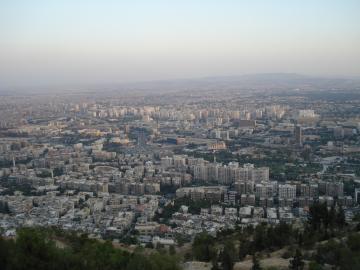
On 17 April 2014, the anniversary of the Syrian Independence day, the United Nations House in Beirut received 100 Syrian young men and women who were brought together by the "National Agenda for the Future of Syria" program ESCWA launched in 2012. Participants gathered to exchange views on the program and its aims, establishing thereby a communication mechanism that would ensure their participation in all stages of implementation of the said program. Youths from all the Syrian spectrum, with its different groups and affiliations, were joined by the program, which gave an overall idea of the issues related to the Syrian crisis from all perspectives in an atmosphere of freedom and transparency that offered an occasion to all those present to see eye to eye on certain points on one hand and to discuss differences in opinion on the other hand.
The meeting kicked off with an overview of the current Syrian economic, social, development and indicators. A discussion ensued that was divided over four main issues, namely, the analysis of the root causes of the crisis; the impacts of the crisis on the Syrian socio-economic structure; the collective notions that bring Syrians together; and the priorities in economic, social and governance rebuilding. Participants were briefed on the general principles that guide the National Agenda, and that derive from the principles of the United Nations, i.e. territorial integrity; respect for State sovereignty; human rights; democracy; social justice; the right to sustainable and equitable development; and the safeguard of regional peace and stability.
Youths expressed their belief that many reasons have led to the escalation of the crisis in Syria, and those varied among regions; such as the absence of the notion of citizenship and the low national sentiment; the absence of a solid common national identity; the unequal distribution of national wealth; the weakness in governance; the gaps in social justice; the lack of a clear framework for national dialogue; the interference of the security apparatus in businesses and in people’s lives; the weak political participation; in addition to other socio-economic factors and to the information revolution that contributed to the spread of the conflict.
Participants also discussed the negative repercussions of this conflict, which anchored religious sectarianism; social fragmentation; the reappearance of once-rare diseases in Syria such as polio and tuberculosis; the destruction of infrastructure; the destruction of the health and education structures; the spread of chaos; the loss of scientific and professional human capital; the destruction of historical monuments, etc. Participants noted however some positive elements that the crisis unveiled on the backdrop of all the negativity, such as the emergence of an enterprising and active civil society; the emergence of the spirit of endeavor in Syrian youths; the increased knowledge of Syria by Syrians; and prompting Syrians, youths especially, to think and open dialogue.
On the subject of common priorities and issues, many points were discussed such as the imperative of not neglecting the issue of expatriates; the importance of bringing refugees back to their homeland; the reliance of the role of government institutions and the civil society in education; the necessity of not neglecting the role of organizations that work outside Syria; the importance of establishing businesses and companies that would provide employment opportunities for people to start over; the rehabilitation of infrastructure; the use of local resources in reconstruction; the creation of a plan to establish and enshrine the concept of citizenship; the protection of individuals and their freedoms; and building relations of trust among all parties in the crisis. Participants also spoke of the importance of disarmament; of guaranteeing political representation for everyone; and of putting together programs to anchor and enshrine civil peace and transitional justice. There was a quasi-unanimous agreement on the priorities of governance, political participation and human rights.
The National Agenda for the Future of Syria team comprises experts hailing from all backgrounds and affiliations in Syria, and boasts the contribution of various United Nations agencies. The program looks to produce a comprehensive National Agenda on the policy alternatives for the most pressing social, economic and governance challenges during Syria's post-conflict transition and to develop networks and partnerships between Syrian stakeholders and regional as well as international partners to facilitate and advocate for post-conflict transition in Syria.
N.B: Image from Wikipedia





